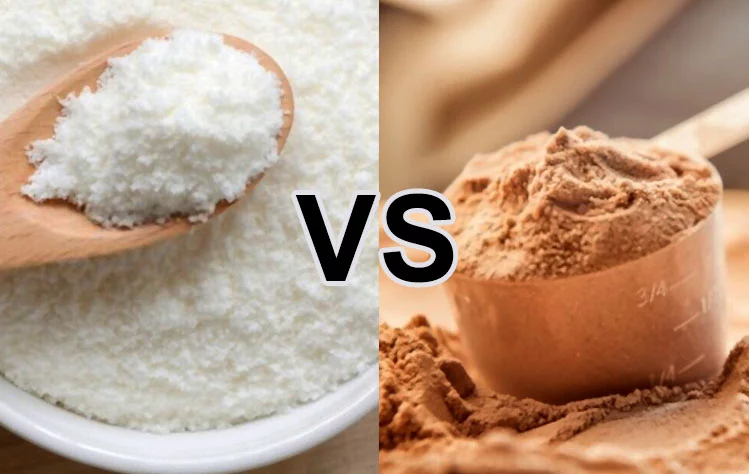Most of us know and appreciate the role proteins play in our body, which is why we go for foods rich in this nutrient. Sometimes, we need more protein than we get from food, prompting us to go for supplements.
Whey protein and collagen protein powder are among the common supplements that do an excellent job for our body’s amino acid needs. So, which of the two is the best? Some claim that collagen powder is better than whey, while others contradict this statement. Both have their selling appeal that we will look at to answer the question.
What is Collagen Protein Powder?
We start by looking at collagen powder, a supplement derived from collagen, a fibrous tissue that is abundant in our bodies and that of other mammals. It is a component of structures like the skin, muscles, ligaments, tendons, and more.
Collagen contains amino acids like glycine, arginine, proline, and hydroxyproline, which are responsible for its various benefits. This supplement comes from animal collagen, mostly cowhides, and other connective tissues.
What is Whey Protein?
Whey is a protein found in milk, mostly extracted during cheesemaking. This supplement is a complete protein source, considering its content of 20 amino acids and nine essential amino acids.
Collagen and whey protein come from animal sources; thus, there is no vegan option. Let us look at their various attributes to know which one is better.
Taste Test
The first attribute we look at is taste. Collagen powder is tasteless and odorless, which makes it easy to take, plus you can mix it in various foods. You can add it to your eggs, cake mix, or smoothie and not notice any difference.
Whey protein is mostly bitter, with some saying that it is repulsive. Flavored varieties of whey protein are manageable but not as versatile as collagen powder when it comes to mixing it with other foods. On taste, collagen takes the win, despite its tastelessness.
Absorption Rate
The other critical area to look at when considering an ideal supplement is the absorption rate. The faster the absorption rate, the better it is. According to studies, the body needs about 90-minutes to digest viscous fluids, like protein shakes. Moreover, your body can digest up to 10 grams of whey per hour, meaning it will take some time before you feel the effects.
On the other hand, the hydrolysis of collagen digests it; therefore, it is in simple form and easy to absorb. Your body will take about 20 minutes to digest and absorb collagen. The fast absorption of collagen protein makes it more efficient than whey protein.
Muscle Building
Nutritionists recommend both protein supplements for muscle growth, though whey shows better results. This is probably to whey’s high content of leucine, an amino acid essential for protein synthesis and tissue regeneration.
Collagen powder also does a great job in muscle building, especially for retaining muscle mass as you age. In the muscle-building discussion, whey is the better choice.
Side Effects
Whey protein appears to have more severe side effects than collagen. They include nausea, thirst, bloating, acne, loss of appetite, and headache. Considering that it is a dairy product, it can be problematic for people who are lactose intolerant.
While collagen has some side effects, they are mostly mild, for instance, heartburn and bloating. Whey protein can cause acne, but collagen helps with acne. Collagen protein is the best supplement to go for if you are lactose intolerant or have skin problems.
Effects on Weight Loss
One of the reasons for taking protein supplements is to help shed body weight. When consumed, proteins reduce the level of ghrelin, the hunger hormone. In contrast, they stimulate the production of peptide YY, a hormone responsible for satiated filling. If you are full, you are less likely to eat more food, controlling your calorie intake in the long run.
Whey and collagen protein powders are ideal for weight loss, though studies show collagen is more effective in leaving you satiated.
Effect on Bones and Joints
Collagen will relieve conditions affecting bones and joints, such as osteoarthritis and joint aches. It helps restore bone density, preventing osteoporosis. For the joints, collagen powder stimulates the synthesis of collagen, which aids in the restoration of tendons and ligaments and calms down the pain. Whey protein does not have any effect on bones and joints.
Anti-Inflammatory Properties
Collagen is gaining immense popularity due to its anti-inflammatory effects. As mentioned earlier, it offers relief against arthritis, which can be painful. Additionally, it shows excellent anti-inflammation properties in the digestive tract by promoting short-chain fatty acid production.
Whey protein does not have anti-inflammatory elements. On the contrary, it appears to increase the inflammatory response.
Both collagen and whey are antioxidants, courtesy of their amino acid content. The former contains glycine, while the latter has cysteine, which will help prevent cellular oxidative stress brought by free-roaming radicals. The result is reduced susceptibility to cancer and heart conditions.
Amino Acid Content
Whey protein powder takes the win on amino acid content, as it has nine amino acids, while collagen powder has 8. Some brands may fortify collagen by adding the missing amino acid to make it a full protein supplement, similar to whey.
Pricing
On the pricing discussion, we can say that the two supplements tie. Their cost is almost similar but varies depending on the brand. The advantage collagen has over whey is its packaging: you can get it in smaller sizes, whereas whey is mostly in large containers.
Verdict
The collagen protein vs. whey protein discussion shows that the former has more redeeming qualities. They include a fast absorption rate, an adaptable taste, and diversity in therapeutic effects. Whey protein takes the lead in muscle-building capabilities and amino acid content.
To improve your body’s muscle profile, go for whey protein powder. Collagen is an excellent pick if you are lactose intolerant or you want to avoid some of the side effects that come with the use of whey protein. Choose an ideal protein supplement from the two and improve your protein intake for your health.






